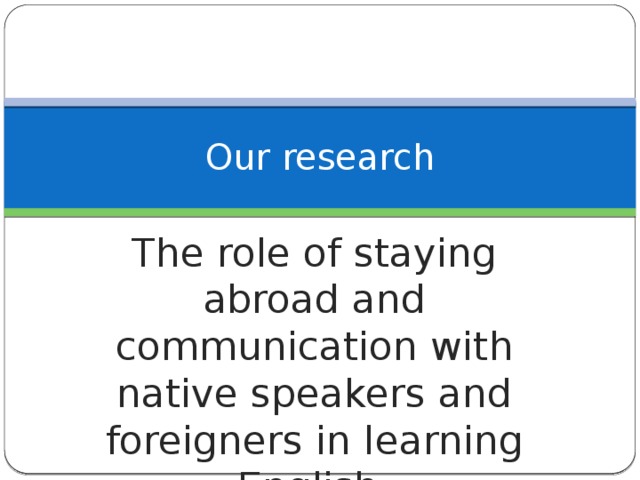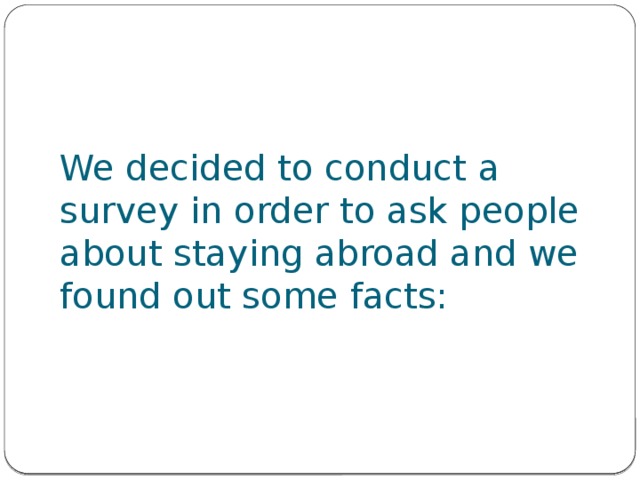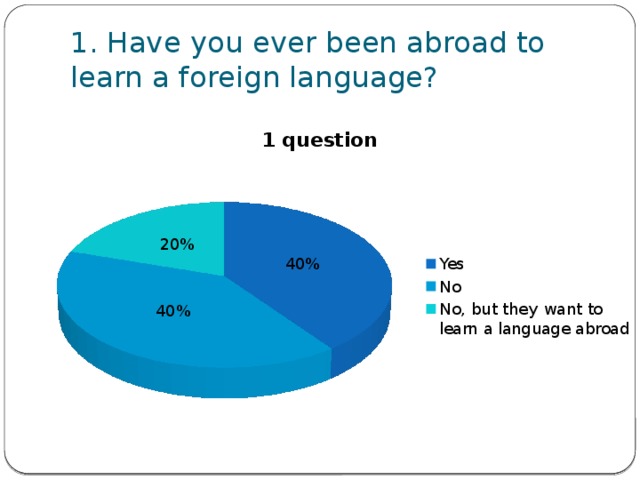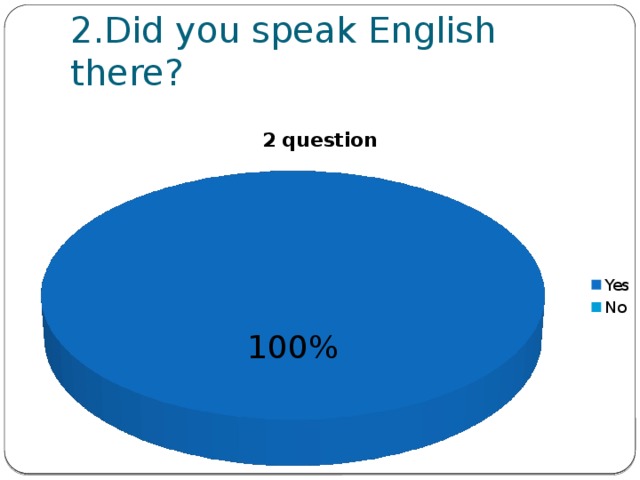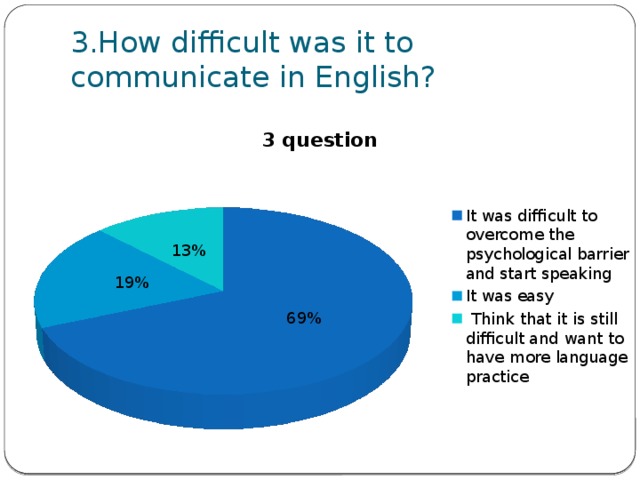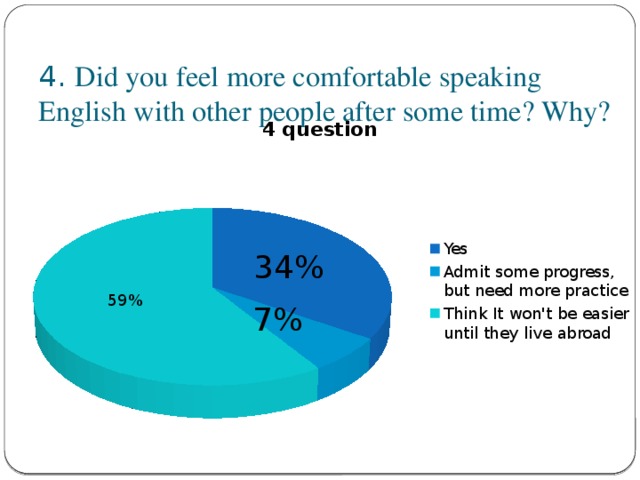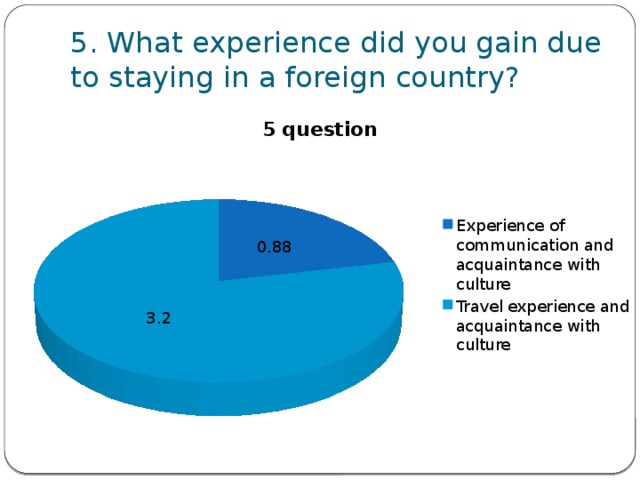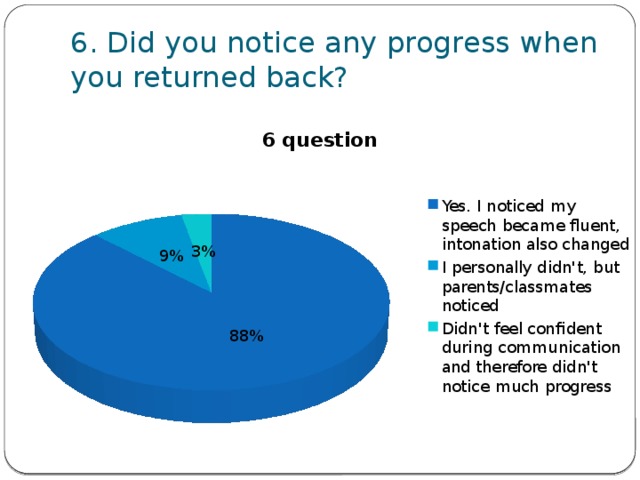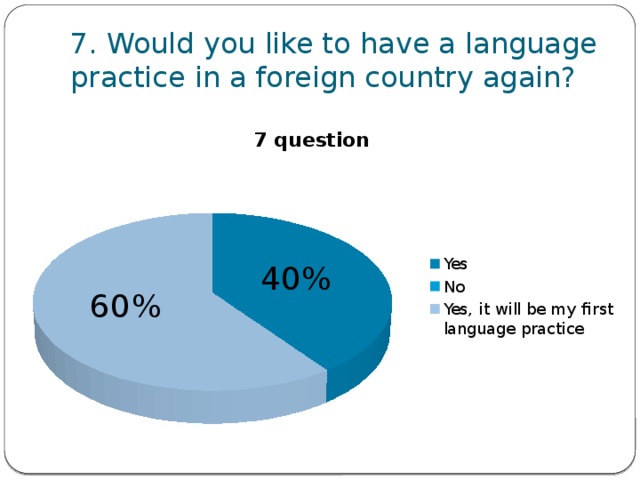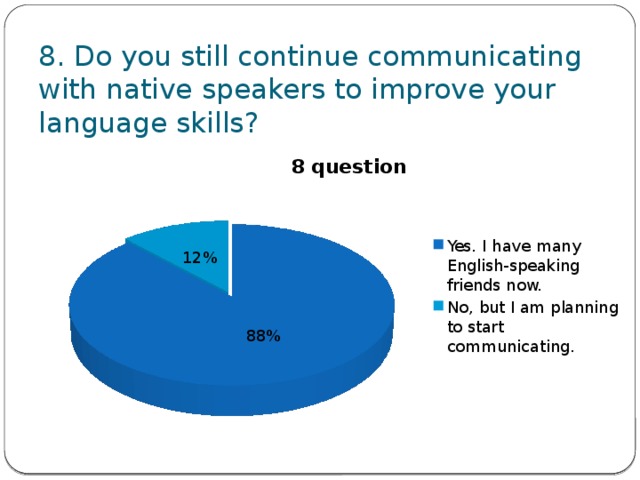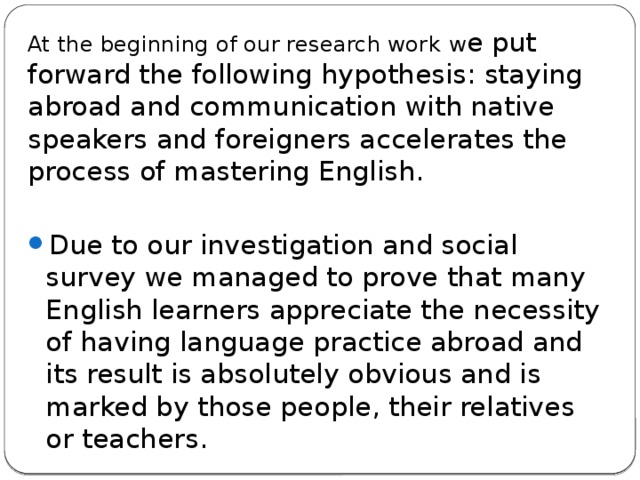Pushkin High School
The Role of Staying Abroad and Communicating with Native Speakers in the Process of Learning a foreign Language
Authors: Kotelnikova Snezhana, 10 a
Raihel Zalman, 10 a
Philippenkov Kirill, 10 a
Teacher: Ivanova Anna Alexandrovna
Syktyvkar
2015
Contents.
Introduction……………………………………………………………………….. 3
Chapter 1. The necessity of learning English in the 21 century. The most effective ways to learn English………………………………………………………………5
Chapter 2. The necessity of living abroad and communicating with native speakers in learning English………………………………………………………………… 8
Chapter 3. The description of the practical part of the research work. The results of the survey………………………………………………………………………….11
Conclusion. Results of investigation……………………………………………...13
List of references………………………………………………………………….14
Appendix 1-8 ……………………………………………………………………..15
Introduction.
The urgency of the problem of mastering a foreign language in today's globalized world is not in doubt. To be a successful person today we need to know at least one additional language besides our mother tongue. However, the traditional "school" teaching methods often do not give the desirable result. The chance that after a traditional course of training people will become fluent in a foreign language is very poor. The reason is obvious - the lack of language practice. Only when you are in everyday systematic linguistic space it becomes possible to master a foreign language culture.
Topicality of our research can be explained in the following way. In recent decades, foreign languages have been the object of attention and have been learned not only by scientists, but also by ordinary people. It is noted, the role played by foreign languages in the implementation of the impact on the consciousness and activity of the general population is increasing. Besides, it’s necessary to point out that knowledge of foreign languages is very important in the field of personal and professional communication rights, which allows modern progressive people to be one step ahead of others.
The importance of knowing a foreign language (usually English) is difficult to overestimate. It is almost impossible to imagine the life of a modern man who does not know a foreign language, because most modern means of communication and dialogues are focused on people, who speak the language. The problem is that people who learn foreign languages should have authentic materials at their disposal and especially contact with native speakers of the language, they should learn and experience a real situation of communication. Nowadays a huge number of authentic records are used at English lessons. It is very important for pupils to communicate with native speakers in real life.
The problem of our investigation is that many people who have learnt a foreign language for years appear to be helpless and not to be able to communicate with native speakers and foreigners when they travel abroad or have to deal with foreigners.
The goal of our research work is investigating how staying abroad and communication with native speakers contributes to mastering foreign languages.
Our tasks are the following:
1) to describe the necessity of learning English in the 21 century and to study the most effective ways to learn English;
2) to analyze language-learners’ opinions about the necessity of living abroad and communicating with native speakers in learning English;
3) to conduct a survey and analyze how language practice abroad influences people’s knowledge of the language.
Methods of our investigation are studying literature on the topic of learning foreign languages, conducting a survey on the effects of language practice abroad and analyzing the results.
We put forward the following hypothesis: staying abroad and communication with native speakers and foreigners accelerates the process of mastering English.
The subject of investigation is: communication with native speakers and foreigners as the most effective method of learning a language.
Chapter 1. The necessity of learning English in the 21 century. The most effective ways to learn English.
We live in the 21t century. This is the era of new technologies, international cooperation, space investigation and scientific progress. All these achievements are impossible without fluent knowledge of foreign languages. It’s a common fact that nowadays English is the international language. Modern English spread around the world from the 17th to mid-20th centuries. Through newspapers, books, the telegraph, the telephone, phonograph records, radio, satellite television, and the Internet, English has become the leading language of international discourse and the lingua franca in many regions and in professional contexts such as science. The English language comes to our aid in our commercial transactions throughout the globe. English is the language of the latest business management in the world and Indian proficiency in English has brought laurels to many Indian business managers. English is a means not only for international commerce; it has become increasingly essential for inter-state commerce and communication. Present-day English is an immensely varied language, having absorbed material from many other tongues. It is spoken by more than 300 million native speakers, and between 400 and 800 million foreign users. It is the official language of air transport and shipping; the leading language of science, technology, computers, and commerce; and a major medium of education, publishing, and international negotiation.
Thus, the necessity of mastering foreign languages, especially English, is obvious. Everyone tries to find his or her method or form of learning English. The variety of ways to learn a foreign language is great. We’ve all heard a thousand times that the only way to master English is to be totally immersed in the language, completely surrounded by it everywhere you go. But we wanted to go deeper than that and find quick and easy ways to start getting immersed. So our research team put together some modern ways to make learning English faster and less official.
One of the most interesting and available ways to improve your English-speaking skills is listening to some English radio stations and podcasts in iTunes. There are tons of podcasts on all topics imaginable these days: entertainment, politics, news. A good way to find one is to look for a podcast from a TV channel you usually watch in your cable TV. Thus, you have an opportunity to train your ear, imitate the right intonation and pronunciation without leaving your car or flat.
Another popular method of learning a language in our modern society is watching Top Videos on YouTube. Most of them are hilarious. This fact makes the process of learning even more entertaining. Besides, looking at the comments can be beneficial to pick up some words and sentences you aren’t familiar with.
Keep on learning a language even when you are plunged into your daily routine. Singing a song in English the way it sounds to you, talking about the weather or any other topic frequently will allow you to improve your pronunciation.
As practice shows many people devote much time to their leisure, hobbies and idols. Taking this into account, we must admit it can also influence positively the process of mastering English. It’s good to spend time listening to interviews or asking your idol some questions.
Nowadays many people learning a foreign language face a great problem realizing they are not ready to speak English when they have such an opportunity. Even a good knowledge of grammar and lexicology do not make us self-confident in English communication. According to this it is very important to overcome a psychological barrier which usually prevents you from speaking. Sometimes it will require hours of careful listening to dare to start a conversation.
Another thing that can contribute to faster learning is paying attention to advertisements in newspapers, magazines and street banners. We must always try to understand what we see and read and express our point of view on these issues.
Television has always had a great impact on the society. It can also be efficient when we learn English. Due to listening to news, watching soap operas or films we try to understand the subject of the conversation or the plot, we guess the meaning of the unknown words according to the context, we see people’s emotions and follow the changes in their intonation.
The 21 century is the age of information technologies and it has registered an increase in the popularity of the Internet and social nets. It has given birth to another modern method of learning languages, such as online communication. The main advantage of this method is that participants of the conversation avoid eye contact, don’t need a fast reaction and can improve both reading and writing skills.
Speaking about learning foreign languages it is impossible not to mention traditional form of studying in comprehensive or language schools, which have always given the basic knowledge of grammar, lexicology, social English, phrasal verbs and all other aspects. This schooling usually includes the following forms of work:
Listening to tapes
Writing letters and compositions
Using a textbook
Reading newspapers and magazines
Using the Internet
Concentrating on grammar exercises
Watching videos
Concentrating on speaking practice
Having studied all the mentioned-above ways of learning English, we suppose that one of them is more efficient and reliable. We stick to the idea that only plunging into the atmosphere of the English language can help us achieve the greatest results. This is possible only due to staying abroad and communicating with native speakers or foreigners.
Chapter 2. The necessity of living abroad and communicating with native speakers in learning English.
It is a common fact that in the past English also played a great role in the World history. Several famous people thought about the necessity of learning foreign languages. Our research team picked up some quotations, which show the meaning of the English language in our life.
“How many languages you know — that many times you are a person.” Сколько языков ты знаешь, столько раз ты человек. (Johann Wolfgang von Goethe)
“If you talk to a man in a language he understands, that goes to his head. If you talk to him in his language, that goes to his heart.” Если ты говоришь с человеком на том языке, который он понимает, ты говоришь с его головой. Если ты говоришь с человеком на его родном языке, ты говоришь с его сердцем. (Nelson Mandela)
“By words the mind is winged.” От слов и ум к высотам устремляется. (Aristophanes)
“Language is the means of getting an idea from my brain into yours without surgery.” Язык — средство получения идеи из моего мозга в ваш без хирургического вмешательства.
(Mark Amidon)
“A different language is a different vision of life.” Другой язык – это другое видение жизни.
(Federico Fellini)
“To have another language is to possess a second soul.” Владеть другим языком – это как иметь вторую душу. (Charles the Great)
“If we spoke a different language, we would perceive a somewhat different world.” Если бы мы говорили на другом языке, мы ощущали бы мир немного иначе.
(Ludwig Wittgenstein)
“Language exerts hidden power, like the moon on the tides.” Язык оказывает скрытое влияние, как луна на приливы и отливы. (Rita Mae Brown)
“Language is the road map of a culture. It tells you where its people come from and where they are going.” Язык – это дорожная карта культуры. Он поведает, откуда пришли его люди и куда идут. (Rita Mae Brown)
“He who does not know foreign languages does not know anything about his own.” Кто не знает иностранных языков, ничего не знает и о своём собственном.
(Johann Wolfgang von Goethe)
Taking into account the subject of our investigation, we want to consider how living in English-speaking countries and communication with native speakers can contribute to mastering English. The best way to prove this idea is based on practical conclusion of other people, who decided to connect their life with the English language. We find it very important to consider the experience of people who have already mastered the language, staying abroad.
As linguist Hannah Peterson declares: “Before I lived abroad I never truly understood the beauty of becoming fluent or even proficient in another language”. In the United States, people do not need to know another language, or many would argue that. Unlike them people in Europe, speak at least two languages somewhat proficiently. People in America have a bit of a disadvantage since geographically they cannot country-hop as easily as Europeans can, and their only neighbors speak English and Spanish. This is why travelling, especially for them is even more important. It is a common fact that in the globalizing world it really can only benefit you to speak another language. It opens up a whole new world of people we can now connect with and understand that we would never have got the chance to get to know had we never learned their language. Living abroad is really the best way to learn a new language since people are forced to challenge and practice their skills on a daily basis.
Another English-learner a citizen of Russia is sure the role of travelling abroad is very important, if you really want to learn the language well. “While you are in another country, you must use a foreign language to communicate with people. If you often travel abroad, you will learn the language better and more quickly. You are immersed in the language environment, where you begin to contact. Everything depends on your own desire. If you really want to learn this language, being in another country will help you. If you do not have such a desire, do not worry; many people feel themselves easily, without knowing the language. Besides, if you don't live in the English speaking country, your English will not be good without trainings”.
Linguists also claim that in most cases the result depends on the teacher’s level of language practice and qualification. From this point of view the advantages of Native English-speaking Teachers in learning English are obvious. NESTs (Native English-speaking Teachers) gain a special status of being a linguistic model, and their English knowledge, proficiency, or competence are regarded as a point of reference. However, the validity of the native speaker as a linguistic model for foreign language learning has been questioned. Additionally, NESTs may not have the necessary insights into lesson preparation and delivery. When teaching grammar, they may have native intuition of what is grammatically acceptable and what is not, but may not have the metalanguage for explaining grammatical rules.
It has been argued that only native speakers should teach English because they have the best pronunciation. On the one hand, this is has some validity. In Japan, Japanese English teachers often have very little experience speaking English so their pronunciation can sometimes be quite poor. Assistant Language Teachers from English speaking countries have easily found work in Japan because the Boards of Education are trying to improve student pronunciation and native speakers have encouraged more pronunciation practice in Japanese public schools.
Every year thousands and thousands of people leave the comforts of their homes to learn English in countries such as the United States, Canada, England, and Australia. Many of them feel that studying a language in the country where it is spoken, they will be able to learn it more quickly. Others feel that studying abroad gives them a kind of prestige in their home country. It may even lead to a better job. And quite few people want to study abroad for the pure pleasure and excitement it brings.
People staying abroad are surrounded by English. They need to pay attention and do some studying, but everything comes faster because English is everywhere - on the streets, in the stores, on the TV.
Making a conclusion, it is important to admit that living in English-speaking countries and communicating with native speakers can be very beneficial for mastering a language and developing language skills. For example, if people have such experience, they will not be afraid to use the knowledge of English anywhere and in any situation. Moreover, due to informal and friendly communication with native speakers, it is easier to master English and thus we can save our time. Besides, learners have an opportunity to practice English every day. It also helps to develop the model of verbal behavior in English. It means that it will be easier to communicate with other native speakers without any difficulties in whatever social situation you appear. When people communicate with a foreign partner through letters, they master writing and reading skills. Learners have freedom of choice of materials, themes, methods, frequency of communication with native speakers and only they are responsible for their choice.
And it can also help find a lot of good friends from other countries.
Chapter 3. The description of the practical part of the research work. The results of the survey.
At the beginning of our research work we put forward the following hypothesis: staying abroad and communication with native speakers and foreigners accelerates the process of mastering English. In order to prove it we conducted a survey to see how language practice abroad influences people’s knowledge of the language. 80 people took part in the questionnaire. All of them are learning English now or learned it some years ago. The questionnaire consisted of 8 questions:
Have you ever been abroad to learn a foreign language?
Did you speak English there?
How difficult was it to communicate in English?
Did you feel more comfortable speaking English with other people after some time? Why?
What experience did you gain due to staying in a foreign country?
Did you notice any progress when you returned in Russia?
Would you like to have a language practice in a foreign country again?
Do you still continue communicating with native speakers to improve your language skills?
The first question showed that 40% (32 people) of English learners have been abroad in order to learn the language. They either took some months of studying abroad or stayed at a language summer camp. Other 40% (32 people) answered they had never studied abroad or stayed at a language camp or school. 20% (16 people) haven’t been abroad in order to learn English but would like to have language practice in English-speaking countries (see Appendix 1).
Those 32 people who gave a positive response to the first question also answered other 7 questions. And 100% of them said they had spoken English there (see Appendix 2).
Asking the third question we got the following results. 68,75% (22 people) found it difficult to overcome the psychological barrier and to start communication. For 18,75% (6 people) of the interviewed people communication with native speakers was not a problem and they felt quite comfortable. 12,5% (4 people) still have some problems understanding or communicating fluently with native speakers and would like to have more language practice abroad (see Appendix 3).
The fourth question helped us understand if people felt more comfortable speaking English abroad some time later. These are our results. 81,25% (26 people) answered positively. Other 15,6% (5 people) admit some progress but still do not feel so confident to communicate fluently and need more practice. And 3,15% of the interviewed (1 person) think that it won’t be easier until they live abroad (see Appendix 4).
Due to the fifth question we found out what experience people gained staying abroad. 87.5% of the interviewed (28 people) admit they got a valuable experience of communication and acquaintance with foreign culture. Other 12.5% (4 people) say it was a great travel experience combined with acquaintance with culture (see Appendix 5).
The sixth question was about the experience people got due to language practice abroad. 87.5% of the interviewed (28 people) gave a positive answer. 9.4% (3 people) say that their teachers, parents and classmates have noticed their progress. 3.1% (1 person) did not feel confident during communication and therefore did not notice much progress (see Appendix 6).
The seventh question was the following: Would you like to have a language practice in a foreign country again? 100% (80 people) of the interviewed expressed their desire to have language practice abroad, 60% of which (48 people) haven’t studied abroad yet (see Appendix 7).
The eighth question sounded: Do you still continue communicating with native speakers to improve your language skills? 32 people who had had communicated English abroad gave the following answers. 87,5% of the interviewed (28 people) consider online communication with foreigners and native speakers of English to be an essential part of the learning process. Other 12,5% (4 people) still don’t communicate with foreign friends but they are planning to start communication soon.
Making a conclusion, we can see that the positive effect of staying abroad and communicating with native speakers is obvious. The majority of English learners who took part in our survey appreciate the value of their language practice due to which they managed to improve the fluency of speech, to gain the right intonation and perfect pronunciation, to enlarge the vocabulary and to get acquainted with up-to-date language.
Conclusion. Results of investigation.
Having studied all the mentioned-above ways of learning English, we suppose that one of them is more efficient and reliable. We stick to the idea that only plunging into the atmosphere of the English language can help us achieve the greatest results. This is possible only due to staying abroad and communicating with native speakers or foreigners.
Besides, it is important to admit that living in English-speaking countries and communicating with native speakers can be very beneficial for mastering a language and developing language skills. For example, if people have such experience, they will not be afraid to use the knowledge of English wherever they are and in any situation. Moreover, due to informal and friendly communication with native speakers, it is easier to master English and thus we can save our time. Furthermore, learners have an opportunity to practice English every day. It also helps to develop the model of verbal behavior in English. It means that it will be easier to communicate with other native speakers without any difficulties in whatever social situation you appear. When people communicate with a foreign partner through letters, they master writing and reading skills. Learners have freedom of choice of materials, themes, methods, frequency of communication with native speakers and only they are responsible for their choice.
And it can also help find a lot of good friends from other countries.
At the beginning of our research work we put forward the following hypothesis: staying abroad and communication with native speakers and foreigners accelerates the process of mastering English. Due to our investigation and social survey we managed to make sure that many English learners appreciate the necessity of having language practice abroad and its result is absolutely obvious and is marked by those people, their relatives or teachers. So, we proved our hypothesis.
Making a conclusion, we can see that the positive effect of staying abroad and communicating with native speakers is obvious. The majority of English learners who took part in our survey appreciate the value of their language practice due to which they managed to improve the fluency of speech, to gain the right intonation and perfect pronunciation, to enlarge the vocabulary and to get acquainted with up-to-date language.
List of references:
Galskova N.D. Modern methods of teaching foreign languages//Published for teachers. – М.: Arcti-Glossa, 2007.
Hackboldt P. Learning foreign languages. 2006.
Rogova G.V. Methods of teaching English (in English)Рогова Г.В.: Published for university students. - М.: Prosveshenie, 2003.
http://engsuccess.ru
greenhearttravel.org
engsuccess.ru
www.5minuteenglish
http://busyteacher.org
http://homelang.ru
http://www.academia.edu
Appendix 1-8.
10
